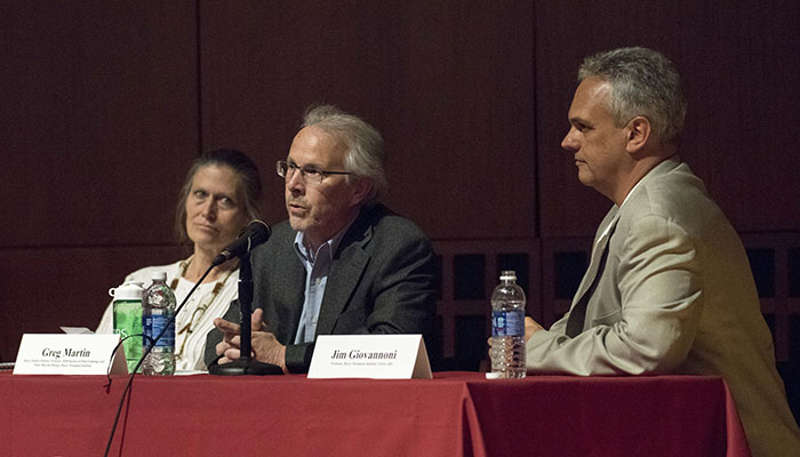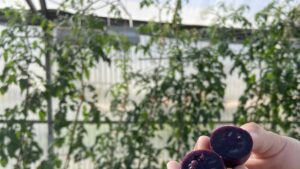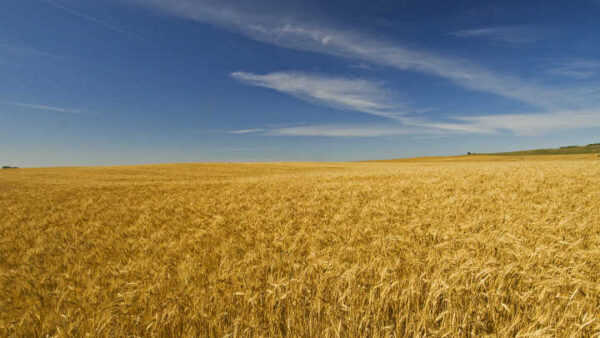If scientific advances are made by standing on the shoulders of giants, then Cornell University Professor Emeritus Steve Tanksley has some sizable shoulders.
Three former members of Tanksley’s lab honored him and his contributions to plant breeding and genetics at the Liberty Hyde Bailey Lecture on June 10. Professors Susan McCouch, Greg Martin and Jim Giovannoni all spoke about the positive impacts of Tanksley’s work on their research and their lives. Kathryn J. Boor, the dean of the College of Agriculture and Life Sciences and a member of the Boyce Thompson Institute (BTI) Board of Directors, moderated the event and led a question and answer session following the talks.
Tanksley is the Liberty Hyde Bailey Professor Emeritus in the School of Integrative Plant Science (SIPS) and was a faculty member at Cornell from 1985 to 2010. He is the recipient of the 2016 Japan Prize for his work at Cornell, where he created the first genetic maps of plants and pioneered new genetic techniques for crop breeding. His work laid the foundation for making improvements in fruit size, nutritional value and disease resistance in major food crops. Tanksley also spearheaded the Cornell Genomics Initiative, which leveraged shared resources and hiring strategies across campus to advance interdisciplinary genomics research at the university.
In introducing Tanksley, Boor credited him and his lasting legacy for Cornell’s top ranking by U.S. News and World Report among plant and animal science programs at universities worldwide. Part of that legacy is the ongoing work of his former lab members at Cornell and BTI.
Susan McCouch is an expert on rice and rice breeding, a professor of plant breeding and genetics at Cornell and an adjunct professor at the BTI. She completed her doctoral work in the Tanksley lab in 1990. Working with two Chinese colleagues, she created the first genetic map of rice, which became a model species for crop genomes, and enabled her to return to Cornell as a faculty member in 1995. She continues to study genetic variation in rice with the goal of increasing food security through the development of pest- and drought-resistant rice and a more stable global rice supply.
Greg Martin is the Boyce Schulze Downey Professor at BTI and was a National Science Foundation postdoctoral researcher in Tanksley’s lab in the early 90s. Together they developed new experimental systems to understand how plants respond to pathogens. About 10 percent of the world’s agricultural production is lost to plant diseases, leading to waste and pesticide use. In his current work, Martin uses genomics technologies to identify and deploy plant disease resistance genes in tomatoes. He noted that plant breeders worldwide increasingly use marker-assisted selection which was pioneered by Tanksley to breed disease-resistant plants.
Jim Giovannoni is a USDA-ARS Research Scientist and BTI professor and was a postdoctoral researcher with Tanksley in the early 90s. During his time in the Tanksley lab, he identified a gene that serves as a master switch for controlling tomato ripening. When fruit ripens, it becomes susceptible to decay. This natural process can lead to food waste, especially in food-insecure regions, where people cannot control ripening through refrigeration or other means. Giovannoni continues to study genes involved in tomato ripening and their potential for creating tastier, more nutritious fruits. He credited Tanksley with championing the sequencing of the tomato genome—an invaluable resource for tomato researchers worldwide.
The event closed with a panel discussion where Dean Boor and the audience members asked questions regarding the challenges posed by climate change, issues of food security and the use of genetically modified crops.













